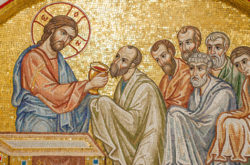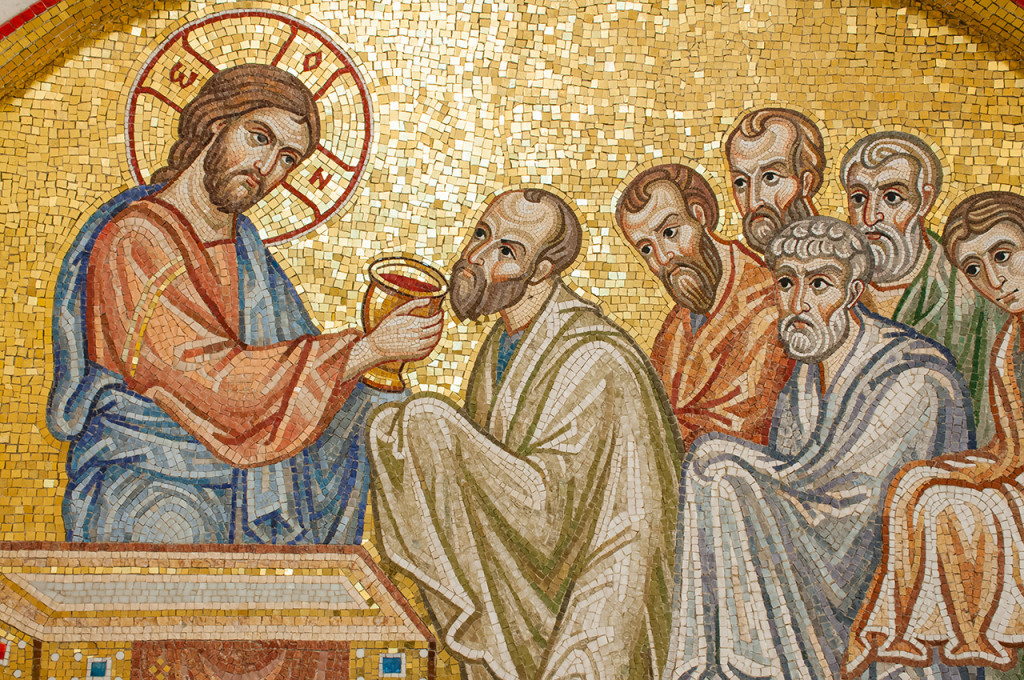 ecology生命」METROPOLITAN JOHN OF PERGAMON 大主教
從根本上來說,許許多多的生態問題,都是靈性的問題。然而,許多人在處理這樣的問題時,往往都忽略了靈性的角度。無論是從歷史的角度或是現實的角度來看,也都不可能不參考宗教與倫理的面向。美國歷史學家Lynn White把這個問題的根源,歸因於基督教的神學,特別是西方教會,他們引用了創世記裡的讚美詩的內容,特別是上帝為了鼓勵原始人類而下達的命令「人類要作這個世界的主宰」。就好像迪卡兒(Descartes)曾說:「人類要成為大自然的主人和擁有者」。這種態度,從神學中汲取了強力的支持和靈感,他們強調人類的優越性,因為他們認為人類擁有上帝的形象,所以這種優越性是十分合理的。而這樣的合理性,使得人類開始與其他的受造物分離,並且激勵人們以輕蔑的眼光,看不起那些所謂非理性、非人類的受造物。
ecology生命」METROPOLITAN JOHN OF PERGAMON 大主教
從根本上來說,許許多多的生態問題,都是靈性的問題。然而,許多人在處理這樣的問題時,往往都忽略了靈性的角度。無論是從歷史的角度或是現實的角度來看,也都不可能不參考宗教與倫理的面向。美國歷史學家Lynn White把這個問題的根源,歸因於基督教的神學,特別是西方教會,他們引用了創世記裡的讚美詩的內容,特別是上帝為了鼓勵原始人類而下達的命令「人類要作這個世界的主宰」。就好像迪卡兒(Descartes)曾說:「人類要成為大自然的主人和擁有者」。這種態度,從神學中汲取了強力的支持和靈感,他們強調人類的優越性,因為他們認為人類擁有上帝的形象,所以這種優越性是十分合理的。而這樣的合理性,使得人類開始與其他的受造物分離,並且激勵人們以輕蔑的眼光,看不起那些所謂非理性、非人類的受造物。
 ecology
ecology
生態學觀點的克修主義:文化式的革新
Ecological asceticism: a cultural revolution.
METROPOLITAN JOHN OF PERGAMON 大主教
呼籲眾人以「新的概念」在「有限資源」下活出「更有品質的生命」從根本上來說,許許多多的生態問題,都是靈性的問題。然而,許多人在處理這樣的問題時,往往都忽略了靈性的角度。無論是從歷史的角度或是現實的角度來看,也都不可能不參考宗教與倫理的面向。美國歷史學家Lynn White把這個問題的根源,歸因於基督教的神學,特別是西方教會,他們引用了創世記裡的讚美詩的內容,特別是上帝為了鼓勵原始人類而下達的命令「人類要作這個世界的主宰」。就好像迪卡兒(Descartes)曾說:「人類要成為大自然的主人和擁有者」。這種態度,從神學中汲取了強力的支持和靈感,他們強調人類的優越性,因為他們認為人類擁有上帝的形象,所以這種優越性是十分合理的。而這樣的合理性,使得人類開始與其他的受造物分離,並且激勵人們以輕蔑的眼光,看不起那些所謂非理性、非人類的受造物。
連帶而來的,是一種錯誤的理解:「誤以為人類可以獨自獲得最高的倫理道德,獨自獲得幸福與成功,而『罪』就成為個人獲得這種狀態的最大限制。換句話說,基督徒可以用一種清淨而善良的意識來破壞自然,只要這種意識是有益於人類福祉的。」現在,人類漸漸開始瞭解,事實上,這種對待大自然的態度才會威脅人類的福祉,它甚至還威脅了人類的生存。人們始終遵循著「追求人類的福祉」的法則,並且不斷受到這個法則的啟發,然而,人們在面對生態的危機時,仍然將人類自身的喜好當作第一順位,而無法視萬物同為上帝的受造物來愛它們,也無法為了地球上非人類的一切,負起應有的責任。
這樣的態度,使事情變得非常複雜,因為,人們無法在「為了生態而犧牲」的態度上取得共識。然而,我們應該要求自己在這個消費主義的社會裡,正視生態的問題。政治家發現要建立一個能夠滿足人類自身喜好的價值尺度是極為困難的。例如:假如有一個政府決定關閉某個污染嚴重的工廠,那麼「失業問題」將無可避免的取代「環境污染問題」而成為該地區最主要的問題。甚至是最有能力的政治家或統治專家,都發現這是極為困難的問題,只要人們還是將自身喜好放在第一順位,要克服這個問題,幾乎是完全不可能的。所以人們的動機,就成了如何面對這場生態危機的關鍵。很明顯的,人們必須以其他的動機來取代自身的喜好,或者,人們必須受到其他動機的強力制約。從實用主義的角度來看,靈性與宗教的尺度在處理生態危機的問題上,變得非常重要。那麼,宗教可以提供人們什麼樣的動機來面對生態的危機呢?以下建議可供大家參考:
無論是靈性或物質的觀點,都強調並維護受造物的神聖性。
這樣的概念,對於那些受到東方宗教支配的文化與社會而言,可能會比較容易接受,但是,對於那些在歷史上曾經是或者現在就是處在猶太教或基督教這一類社會文化傳統下的人來說,就變得不太容易。在西方的文化中,由於對於偶像崇拜的恐懼以及唯理主義傳統的影響,要提升受造物的神聖性,變得十分困難。
讓我們來看看正教會的觀點。一直以來,正教會的傳統都反對古老的希臘羅馬式的異教信仰,正教會對於大自然,一直秉持深切又堅定的靈性尊重,因為,正教會認為,只有人類才能賦予自然界神聖性,這樣的觀點使人類肩負重任。人類是所有受造物的祭司,人類能夠自由地主宰其他受造物,使它們成為萬物與上帝合一的媒介。這意謂著物質世界的受造物對於人類而言,並不是個人製造慾樂的工具,而是上帝所賜與的神聖禮物,這些受造物存在的目的,是要成為萬物與上帝合一的媒介。這些自然界的受造物在「聖禮儀」方面的實用性,形成了一種文化形式,也就是一種以人類為核心的思維,同時,人類對於物質世界也必須懷抱著深層的敬意。
為「罪」的概念提出一個正確的看法。
在我們的社會中,「罪」是一個普遍被瞭解的概念,當人們想到「罪」時,每個人心中,至少會想起基督教倫理學中的那些人類學或社會學名詞,因為,人們自然地會把「罪」想成是「自私自利」和欲樂的僕人。對「人類」造成傷害的行為才會稱為「罪」。很顯然的,傷害大自然環境並沒有被歸在「罪」的範疇當中。
如果大自然不再是自私自利的人類的奴隸,並且,大自然成為「人類與上帝結合」所不可或缺的元素,人們對於「罪」的想法就會改變。事實上,如果沒有大自然的話,人類自己無法變成與上帝合一的媒介,也無法促成人類與上帝的親密關係(就好像我們的肉體對於我們的身份認同來說,是不可或缺的,而且,如果沒有其他受造物的存在,我們的身體也不可能存在),人類對於大自然的傷害,使大自然不再是我們與上帝合一的媒介。人類的「罪」反抗了大自然,這樣的後果是很嚴重的,因為人類除了沒有尊重大自然這個來自上帝的神聖禮物之外,還使人類無法圓滿與上帝之間的完美關係,而這個部份也是最嚴重的部份。人類的「個人主義」與人類的「罪」攜手合作,共同打擊我們的大自然:生態危機為這樣的傷害行為做了最有力的見證。
禁欲與克己的精神。
在我們的心中,克修主義似乎代表著「為了更崇高的精神界而貶低物質界的事物」。這當中隱含了柏拉圖對於物質與肉體的觀點,這種想法與猶太教和基督教傳統的思想(物質世界是人類身份認同所不可或缺的一部分)背道而馳。的確,在基督教傳統中,我們可以輕易的發現柏拉圖思想的影響,或許在其他的宗教當中,也能夠找到柏拉圖思想的影子。這類的禁欲主義,因為對物質世界採取貶低的看法,所以不但無法挽救生態危機,還使之加劇。然而,我們應該秉持「生態學上的克修主義」的精神,總是對物質界的受造物(其中包括人類的肉體)存著深層的敬意,並且在心中謹記,自己是一切受造物的主宰,一定要善用人類的身份,將它們化作與上帝合一的媒介,並且,總是細心考量一切受造物的極限,並且尊重它們發揮良能的限度。
我想提出一個最後,也是最重要的觀點。人類必須了解到自然資源並不是無限的,整個受造物都是有限的,同樣的,自然界所能提供給我們使用的資源也是有限的。以消費主義哲學為中心的思想,遍佈在我們這個世代,人們似乎都忽視了這個事實。我們努力的生產許多生活必需品,並努力的消費,而這些必需品,對古人來說,卻都是沒有必要的東西。我們必須重新思考生命的品質。生命的品質並不需要這麼多的東西才能夠維持。約束我們對自然資源的使用,可以讓我們更加的快樂,我們不需要再無止境的競爭,費盡心力來獲取更多資源。生活品質的成長必須取代經濟發展這個由定量統計所支配的概念。在人類的社會中,克修與克己的精神不再是一個宗教上的古怪行徑,而是一個取代「數量」而與「品質改善」有關的同義字。
這一切免不了許多重要的改變,還有基礎概念的修正,和各式各樣的政治、經濟、科學與社會制度上的重新定義。我想,它應該可以稱得上是一種文化上的革命。要啟動這樣的文化革命需要其他方面元素的配合。它絕對不只是技術上的白皮書,它需要成為眾人心中的深層信念和動力,因為,如果沒有一個好的理由或動機,人類就難以做出犧牲。
這些理由和動機,要不是具有「恐懼」的特性,就是具有「愛」的特性,宗教同時使用這兩種方法。我們所面臨的生態危機似乎會讓人聯想到「恐懼」,一種害怕我們的星球毀滅的心情,這種普遍的心情,可以改變我們行動的目的。然而,另一種更正面的動機也是不可或缺的,就是對上帝的受造物以及所有的人類的「愛」,這種「愛」會自然的帶領我們減少浪費自然資源,並且讓這些自然資源可以與其他人一樣,獲得更多的公義。透過教育,我們可以不斷的提升保育的層次,但可能無法像宗教或是靈性一樣,從根源之處來解決這個問題。在現今這個時代,我們所面臨的環境挑戰,需要所有的宗教社群來參與。生態的問題,已經成為一個大層面的問題,也是一個靈性的問題。
—————————————————–
the ecological problem is, at root, a spiritual issue. Many people dealing with it tend to overlook its spiritual aspects. And yet both historically and from the practical point of view it is impossible to address it without reference to religion and ethics. The American historian Lynn White was right to attribute the causes of the problem to Christian theology, particularly of the Western Church, which exploited the verses of Genesis containing God’s order to the first human beings to ‘dominate the earth’ in order to encourage them, as Descartes bluntly put it, to be ‘masters and possessors of nature’. This attitude drew further support and inspiration from a theology that stressed the superiority of humans because of their ‘rationality’, which it regarded as ‘God’s image’ in Man. Such a rationalistic approach detached human beings from the rest of creation and encouraged them to look down with contempt on whatever is not rational, not human.
Along with this, an understanding arose of the human person as a thinking individual whose happiness and prosperity acquired the status of the highest good in ethics. Sin became limited to whatever contradicts or prevents these. A Christian could, therefore, destroy nature with a clear and good conscience, as long as this contributed to the fulfilment of human happiness. Now, human beings are beginning to realize that such an attitude towards nature actually threatens human happiness, even human existence itself. In doing so, they are not departing from the principle of promoting human happiness. Indeed, they are deeply and almost exclusively motivated by it. The ecological crisis is thus still viewed and approached from the angle of human self-interest and not from those of love for the rest of God’s creation or of a feeling of responsibility for the survival and welfare of whatever is not human on our planet.
This complicates matters, for it is difficult to arrive at a common mind on the sacrifices that ought to be demanded of us in order to face the ecological problem in our consumerist society. Politicians find it extremely difficult to establish a scale of values that would satisfy humanity’s self-interests. If, for example, a government decides to close down a certain factory on account of its pollution, unemployment will almost inevitably emerge as the main problem in the area, replacing damage to the environment. Even the most competent politicians or technocrats will find it extremely difficult, if not impossible, to cope with such a situation as long as peoples’ motivation remains governed by self-interest. So motivation plays a decisive role in how the ecological problem is faced, and it is clear that human self-interest must give way to other motives, or be strongly conditioned by them. This gives the spiritual and religious dimension decisive importance for the ecological issue, from the practical point of view. What kind of motivation can religion offer people facing the ecological crisis? Here are some suggestions:
Stressing and promoting the idea of the sacredness of creation in all its aspects, spiritual as well as material. This may be easier in cultures and societies where oriental religions are predominant, but could prove to be much more difficult where the Judeo-Christian tradition is the main religious force either historically or actually. The fear of paganism and a strong tradition of rationalism will make it difficult to promote the idea of the sacredness of nature – or even of sacredness in general – in Western culture.
In the Orthodox Church – behind whose tradition lie long battles against ancient Greco-Roman paganism – a spirituality involving a deep respect for nature is strongly conditioned by the view that nature acquires sacredness only in and through the human person. This gives humanity decisive importance and responsibility. A human is the Priest of creation as he or she freely turns it into a vehicle of communion with God and fellow human beings. This means that material creation is not treated as a means of obtaining pleasure and happiness for the individual, but as a sacred gift from God which is meant to foster and promote communion with God and with others. Such a ‘liturgical’ use of nature by human beings leads to forms of culture which are deeply respectful of the material world while keeping the human person at the centre.
A drastic revision of the concept of sin. Sin has been normally understood, by Christian ethics at least, in anthropological and sociological terms alone, because nature came to be understood as a ‘servant’ of humanity’s self-interest and happiness. Sin became only what caused harm to oneself or to other human beings. Obviously, damage to nature does not fall within this category of ‘sin’.
This changes if nature ceases to be the slave of human interests and becomes an indispensable link of communion between human beings and with God. Since humans cannot operate as agents of relationship and communion without nature (our bodies are both indispensable to our identity and inconceivable without the rest of creation), any harm inflicted upon nature would render it incapable of performing its function as a vehicle of communion between us and with God. Sin against nature, therefore, is serious not only because it involves disrespect towards a divine gift, but also – and mainly – because it renders the human being incapable of fulfilling its relational nature. Human individualism goes hand-in-hand with sin against nature: the ecological crisis bears eloquent witness to that.
A spirit of asceticism. Asceticism has been associated in our minds with a devaluation of matter for the sake of ‘higher’ and more ‘spiritual’ things. This implies a Platonic view of matter and the body, which is not compatible with the Judeo-Christian tradition where the material world is an indispensable part of the human identity itself. True, a Platonic influence can be easily observed in the history of Christian tradition, and perhaps in other religions too. But this does not concern us here. Such types of asceticism, involving as they do a devaluation or contempt of the material world, aggravate instead of solving the ecological crisis. An ‘ecological asceticism’ – if we may coin such a term – always begins with deep respect for the material creation, including the human body, and builds upon the view that we are not masters and possessors of this creation, but are called to turn it into a vehicle of communion, always taking into account and respecting its possibilities as well as its limitations.
misty beach This last point is of paramount importance. Human beings must realize that natural resources are not unlimited. Creation as a whole is finite and so are the resources that nature can provide for our needs. The consumerist philosophy of life, which prevails in our time, seems to ignore this truth. We encourage growth and consumption by making ‘necessary’ things which previous generations could easily live without. We need to reconsider our concept of quality of life. Quality does not need quantity in order to exist. A restriction in our use of natural resources can lead to a life that is happier than the endless competition of spending and acquiring more and more. Qualitative growth must replace the prevailing conception of economic development which is dominated by quantitative statistics. Asceticism must cease to be a notion referring to a class of religious eccentrics and become synonymous with qualitative – instead of quantitative – progress in human societies.
All this would inevitably involve major shifts of emphasis and basic revisions and redefinitions in political, economic and scientific and social institutions of all kinds. It would probably amount to no less than a cultural revolution. Such a reorientation of our culture would require the involvement and cooperation of all the factors responsible for forming it. It could not be simply a matter of technocratic planning; it would require a change in people’s deeper convictions and motivations, since no human being can sacrifice anything without a reason or motive.
Such reasons and motives can be characterized by either fear or love. Religions have employed both of these. The ecological crisis we are facing seems to suggest fear – the fear of the destruction of our planet – as the prevailing motive for a change of direction. We must insist, however, on more positive motives. Love of God’s creation and our fellow human beings would lead us naturally to restrict the consumption of natural resources and share them more justly with other people. This can be done through education from the primary to the higher level, but perhaps nothing can be more effective for such a purpose than religion and the spirituality that stems from it. Every effort must be made to involve the religious communities in the environmental challenges of our time. The ecological problem is to a great extent a spiritual one.


